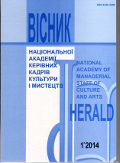INDUSTRY OF A LEISURE WITHIN THE CONTEXT OF MODERN CULTURAL TRANSFORMATION
DOI:
https://doi.org/10.32461/2226-3209.1.2014.137888Keywords:
leisure, leisure practices, cultural industry, leisure subcultureAbstract
This article is dedicated to revealing and grounding pre-conditions, which promoted the formation of leisure ascultural industry in countries of Western Europe and US.
It is marked that in the second half of the ХХth cent., concurrently with the increase of leisure significance as acomponent of human vital functions, opportunities of ways and means enrichment of leisure needs satisfaction ofpopulation are formed. The complex of interrelated and interdependent factors serves as the basis for development ofleisure sphere, among which are social and economic, technological achievements, educational and cultural level,improvement of social policy, development of geographical mobility. Although the leading factor, which influenced theformation of leisure as a cultural industry, is defined as increase of spare time and alteration of its inner structure, whichforms new necessities of a person and causes the appearance of new leisure activity types.
The evolution of leisure practices in modern society is traced with using statistic materials of researchinternational projects, which were realized in the second half of the XXth cent. – beg. of the XXIst cent. ("The Use ofTime: Daily Activities of Urban and Suburban Population in Twelwe Contries", 1972, "Leisure Policy in Europe", 1993,"The Future of Leisure Time", 1994, "Free Time and Leisure Participation: International Perspectives", 2005, etc.).
Leading pre-conditions which had an influence on actualization of the problem of organizing culturally expedientleisure in modern world are grounded. Among such the increase of spare time is determined, which influenced changesin the regimes "work-rest" (іndividualization and personification of work schedule, input of the shortened working week,lengthening of studying terms duration, etc.). At the same time it is stressed, that spare time increase doesn’t meanautomatic rise of leisure scope, which is intensively corrected under the influence of other time expenses forms(additional work, housekeeping or unemployment rise). The expediency of taking into account the peculiarities of socialand demographic structure of society is underlined, which gives an opportunity to trace dynamic increase of spare timequantity in the XXth cent. only in some definite categories of population: children, retired people and youth (owing to thelengthening of studying terms duration). Restructuring of spare time also played an important role in leisure spheredevelopment, main part of which is connected with days off, holiday periods and holidays.
The improvement of life standards, family welfare in general, influenced the development of leisure as culturalindustry as well, which caused changes in the structure of consumer’s expenditures in the direction of satisfying notmaterial necessities and created new opportunities for using leisure at one’s own request. In the first half of the XXthcent. the population spent for food and residence almost all family budget, since the 50s, slowly but ceaselessly this parthas been reducing, causing changes in the expenditures structure: not home spending (visiting of restaurants, travelling,acquirement of sport inventory, etc.) increase essentially quicker. Disengaged means are used for acquisition ofinhabited place, radio- and TV equipment, car, other domestic goods, which not only make housekeeping easier, butchange person’s attitude to his leisure in boundaries of own home and not.
Leisure is used actively by power as a social neurohumor in solving numerous social problems (from solving valueddisorientation to rise of the quantity of working places and to surmounting the questions of unemployment). Therefore, in thearticle attention is paid to the questions of law regulating the leisure organization and ensuring rights and access to findingqualitative leisure service, which don’t make harm to the person’s spiritual and cultural development. According to the law inSwitzerland, Germany, France, Holland the right of the person for leisure and cultural development are protected byeducational establishments, family, social and medical services, and law enforcement authorities as well.
The process of creating leisure establishments network, among which a numerous quantity of voluntary,commercial and state establishments exists, is analyzed. In big cities "shop" alleys, which give various commercial,superficial and recreational services, become especially popular.
Peculiarities of using leisure by different social groups give a pretext to assert leisure subculture development ofchildren, teenagers, adults and retired people. But leisure time, the amount of which increases incessantly, is usedmostly for viewing TV programs, listening to the radio and reading periodicals. It is proved that passive forms of leisurestay the most popular among various categories of population during prolonged time (view of TV programs, readingperiodic press, listening to the radio, over the last decades virtual leisure joins them). For the most part of population theyare the most available financially and intellectually, because they don’t demand neither special technical equipment noradditional financial expense, special knowledge, skills and practical knowledge.
Downloads
Published
Issue
Section
License
Authors who publish with this journal agree to the following terms:
1. Authors retain copyright and grant the journal right of first publication with the work simultaneously licensed under a Creative Commons Attribution License International CC-BY that allows others to share the work with an acknowledgement of the work's authorship and initial publication in this journal.
2. Authors are able to enter into separate, additional contractual arrangements for the non-exclusive distribution of the journal's published version of the work (e.g., post it to an institutional repository or publish it in a book), with an acknowledgement of its initial publication in this journal.
3. Authors are permitted and encouraged to post their work online (e.g., in institutional repositories or on their website) prior to and during the submission process, as it can lead to productive exchanges, as well as earlier and greater citation of published work (See The Effect of Open Access).


